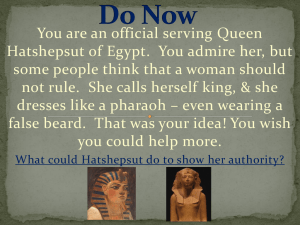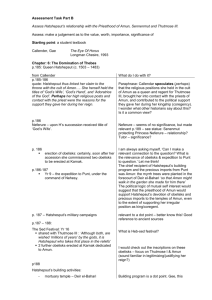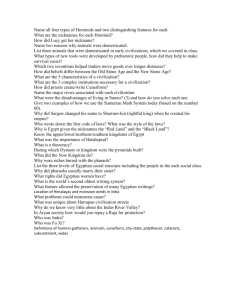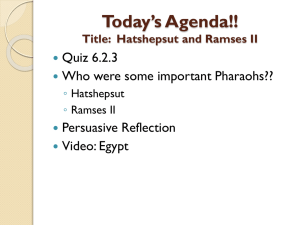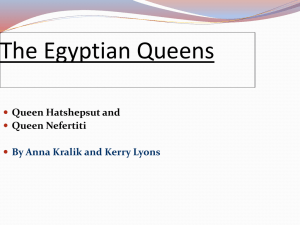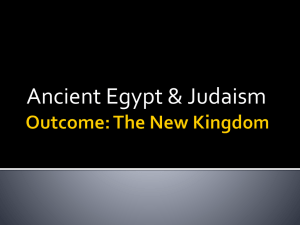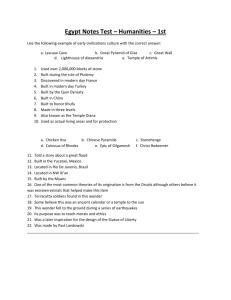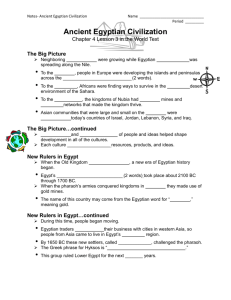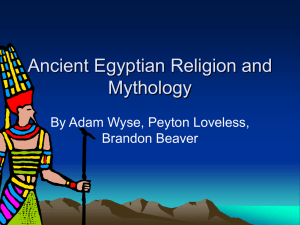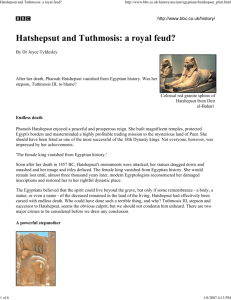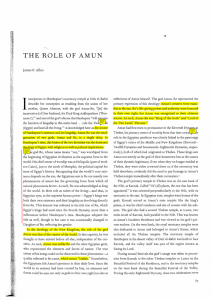Hatshepsut 1
advertisement
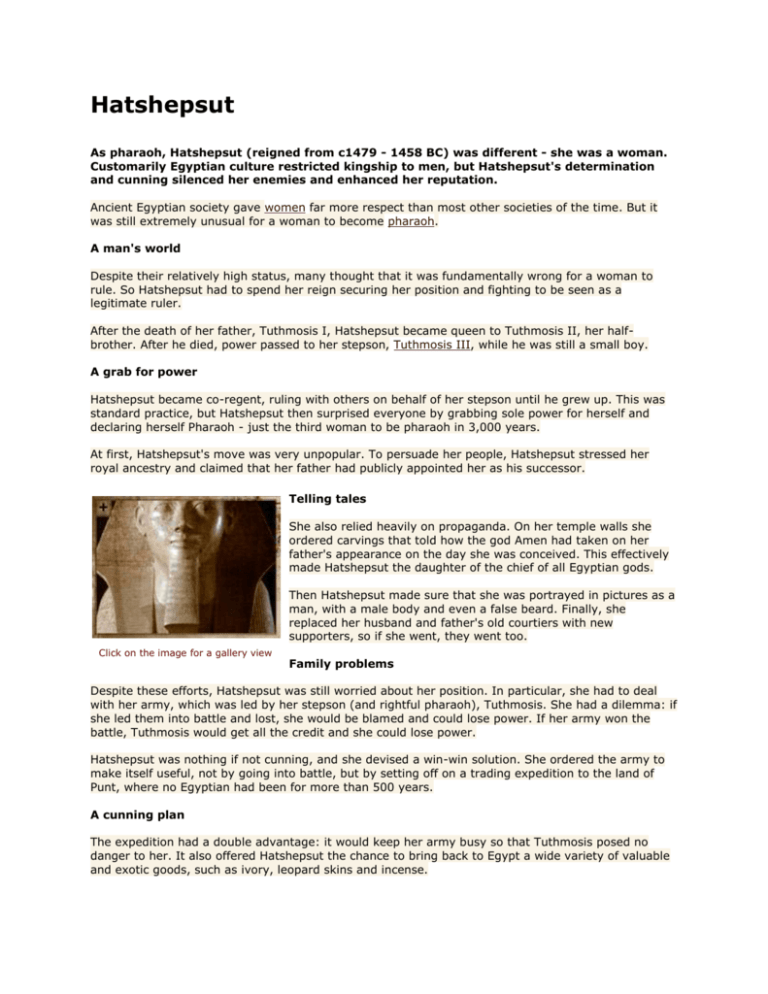
Hatshepsut As pharaoh, Hatshepsut (reigned from c1479 - 1458 BC) was different - she was a woman. Customarily Egyptian culture restricted kingship to men, but Hatshepsut's determination and cunning silenced her enemies and enhanced her reputation. Ancient Egyptian society gave women far more respect than most other societies of the time. But it was still extremely unusual for a woman to become pharaoh. A man's world Despite their relatively high status, many thought that it was fundamentally wrong for a woman to rule. So Hatshepsut had to spend her reign securing her position and fighting to be seen as a legitimate ruler. After the death of her father, Tuthmosis I, Hatshepsut became queen to Tuthmosis II, her halfbrother. After he died, power passed to her stepson, Tuthmosis III, while he was still a small boy. A grab for power Hatshepsut became co-regent, ruling with others on behalf of her stepson until he grew up. This was standard practice, but Hatshepsut then surprised everyone by grabbing sole power for herself and declaring herself Pharaoh - just the third woman to be pharaoh in 3,000 years. At first, Hatshepsut's move was very unpopular. To persuade her people, Hatshepsut stressed her royal ancestry and claimed that her father had publicly appointed her as his successor. Telling tales She also relied heavily on propaganda. On her temple walls she ordered carvings that told how the god Amen had taken on her father's appearance on the day she was conceived. This effectively made Hatshepsut the daughter of the chief of all Egyptian gods. Then Hatshepsut made sure that she was portrayed in pictures as a man, with a male body and even a false beard. Finally, she replaced her husband and father's old courtiers with new supporters, so if she went, they went too. Click on the image for a gallery view Family problems Despite these efforts, Hatshepsut was still worried about her position. In particular, she had to deal with her army, which was led by her stepson (and rightful pharaoh), Tuthmosis. She had a dilemma: if she led them into battle and lost, she would be blamed and could lose power. If her army won the battle, Tuthmosis would get all the credit and she could lose power. Hatshepsut was nothing if not cunning, and she devised a win-win solution. She ordered the army to make itself useful, not by going into battle, but by setting off on a trading expedition to the land of Punt, where no Egyptian had been for more than 500 years. A cunning plan The expedition had a double advantage: it would keep her army busy so that Tuthmosis posed no danger to her. It also offered Hatshepsut the chance to bring back to Egypt a wide variety of valuable and exotic goods, such as ivory, leopard skins and incense. The expedition was an enormous success and enhanced Hatshepsut's reputation. She became the ruler who had reached out to foreign countries and who had delivered to Egyptians marvelous wonders from far away. Erased from history After 22 years of reign, Hatshepsut died and her stepson, Tuthmosis III, finally gained the throne that had been rightfully his for decades. Tuthmosis resented his long wait for Click on the image for a gallery view power and was determined to make Hatshepsut pay. He wanted to wipe her from history so that Egyptians would forget that she had ever ruled. In a massive operation, he ordered that her name and image be removed from every part of Egypt. He was so successful that Hatshepsut was totally erased from Egyptian history until 1903, when British archaeologist Howard Carter found her tomb and her story was rediscovered for the first time in 3,500 years. Primary account of the Birth of Hatshepsut – as shown in relief in Hatshepsut’s temple Translated from Emma Brunner-Traut, AltEgyptische Marchen, 5th ed. (Dusseldorf und Ksln, 1979), pp. 76-87. Amun summoned the Great Ennead in heaven to him and proclaimed to them his decision to procreate for the land of Egypt a new king, and he promised to the gods all good through it. As successor, Hatshepsut was chosen the unique woman; the royal office for her was claimed. "She builds your chapels," said Amun to the Ennead. "She consecrates your temples . . . she makes you rich offerings . . . the dew of heaven shall fall in her time . . . and the Nile shall be high in her time. Surround her with your protection, with life, happiness unto eternity." The Ennead answered, "We have come herewith. We surround her with our protection, with life and happiness . . . " Amun charged Thoth, the god of wisdom and messenger, to seek Queen Iahmes, the wife of the reigning king, whom he selected as the future mother of the successor, and Thoth answered him as follows: "This young woman is a princess. She is called Iahmes. She is more beautiful than all the women in the whole land. She is the wife of the king, the king of Upper and Lower Egypt, Tuthmosis I, and his majesty is still a youth. Go therefore to her . . ." Then Thoth led Amun to Queen Iahmes. There came the ruling god, Amun, Lord of the throne of the Two Lands, after he had assumed the form of the majesty of her husband, the king of Upper and Lower Egypt, Tuthmosis I. He found her as she rested in the innermost (area) of her palace. Then she awoke because of the scent of the god, and she smiled at his majesty. At the same time, he went there to her and was full of desire for her. He gave her his heart and allowed her to recognize him in his divine form, after which he approached her. She rejoiced to show her beauty, and his love went over into her body. The palace was flooded with the fragrance of the god. All his scent was the fragrance from Punt. The royal wife and king's mother Iahmes spoke to the majesty of the splendid god Amun, to the lord of the throne of the Two Lands, "My lord, how great is your glory. How splendid it is to see your face. You have enclosed my majesty with your glance. Your fragrance is in all my parts." [Thus she spoke,] after the majesty of this god had done with her all which he wished. Then Amun, the lord of the throne of the Two Lands spoke to her, "Hatshepsut is thus the name of this your daughter whom I have laid in your body, according to the speech of your mouth. She will exercise the splendid kingship in the whole land. My glory will belong to her, my authority will belong to her, and my crown will belong to her. She will rule the Two Lands (Egypt) . . . I will surround her every day with my protection in common with the god of the respective day." After Amun attended the queen, determined the name of the child, and promised her the lordship over Egypt, he spoke with the creator god Khnum who would form the child on the potter's wheel from mud. Thereby he commissioned him to create for the child a ka. And Khnum answered him : "I form this your daughter prepared for life, prosperity, and health, for food, nourishment, for respect, popularity, and all good. I distinguish her form from the gods in her great dignity of king of Upper and Lower Egypt." Then according to the divine instruction, Khnum created the royal child Hatshepsut and her ka on the potter's wheel, and the goddess of birth, the frog-headed Heket, proffered life to her. Khnum spoke in addition, "I form you with this divine body . . . I have come to you to form you completely as all gods (Kings), give to you all life and prosperity, give to you enduring and joy . . . and give to you all health, deliver to you all flat lands and all mountain lands as well as all subjects, give to you every food and nourishment and cause that you appear on the throne of Horus like (the sun god) Re (himself). I cause that you stand as the head of all the living when you appear as king of Upper and Lower Egypt. Thus as your father Amun-Re who loves you has commanded it." Khnum's divine companion Heket concluded with speeches of blessing and gave the child with her word, life, enduring, and happiness in all eternity. The divine messenger Thoth, dispatched by Amun, proclaimed to the royal mother Iahmes the office and title which heaven had conferred on her. He called her "the daughter of Geb, heir of Osiris, princess of Egypt, and mother of the king of Egypt. Amun the lord of the throne of the Two Lands is content with your great dignity of Princess who is great of favor, cheerfulness, charm, loveliness, and popularity," and his message to the great royal wife Iahmes concluded with the wish that she live, endure, be happy and everlastingly joyful in heart. Khnum, the creator god, and his divine companion Heket conducted the pregnant queen to the birth and the birth place and there pronounced their blessings. Khnum spoke to her, "I surround your daughter with my protection. You are great, but the one who opens your womb will be greater than all kings till now . . . " Thus spoke Khnum, the potter . . . and Heket, the deliverer. The queen who accordingly immediately became pregnant and now suffers the birth pains was delivered in the presence of the god Amun and goddess of the birth place Mesekhnet with the assistance of many spirits and divine nurses. After a long speech by Amun, Mesekhnet executed her blessing on the child. From the Egyptian Book of the Dead The Declaration of Innocence I have not done crimes against people, I have not mistreated cattle,... I have not known what should not be known, I did not begin a day by exacting more than my due,... I have not blasphemed a god, I have not robbed the poor. I have not done what the god abhors, I have not maligned a servant to his master. I have not caused pain, I have not caused tears. I have not killed, I have not ordered to kill, I have not made anyone suffer. I have not damaged the offerings in the temples, I have not depleted the loaves of the gods, I have not stolen the cakes of the dead... I have not increased nor reduced the measure,... I have not cheated in the fields. I have not added to the weight of the balance, I have not falsified the plummet of the scales. I have not taken milk from the mouth of children, I have not deprived cattle of their pasture... I have not held back water in its season, I have not dammed a flowing stream, I have not quenched a needed fire. I have not neglected the days of meat offerings, I have not detained cattle belonging to the god, I have not stopped a god in his procession. I am pure, I am pure, I am pure, I am pure!

